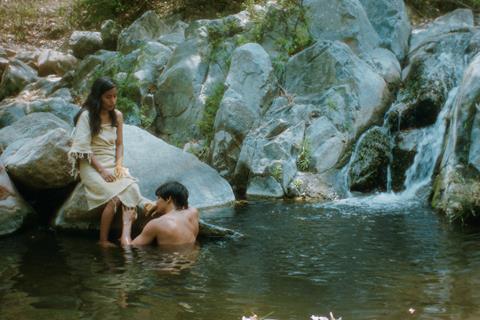Lisandro Alonso’s trademark slow cinema treads new metaphysical ground into very hazy terrain

Dir: Lisandro Alonso. 2023. France, Germany, Portugal, Mexico, Argentina. 146 mins.
Argentine director Lisandro Alonso was one of the names that kick-started (or perhaps gently nudge-started) 21st century ‘slow cinema’ with his 2001 debut Freedom. Since then, his exploratory, peripatetic dramas – or narratively flattened-out anti-dramas – such as Los Muertos (2004) and Liverpool (2008) have been an essential watch for lovers of cinema at its most contemplative. His work acquired an epic, dream-like new inflection with 2014’s more than usually approachable Jauja, starring Viggo Mortensen.In long-awaited follow-up Eureka, a sort of earthbound space, time and mind odyssey, Alonso sets out on a mind-bending and often perplexing journey. Non-adepts will be reluctant to follow him, while even admirers may feel that he’s over-indulging his hankerings to ramble in the metaphysical outer limits. Performances by Mortensen and Chiara Mastroianni may boost the sales quotient, but otherwise Eureka is very much for the festival faithful.
It’s almost as if Alonso were parodying his own practice of dead time
Alonso is certainly attempting something new here, however, and something so unlikely that he at first appears to be trolling his fanbase: a period Western in black and white with overtly hokey, seemingly parodic flourishes. The film begins in the same Academy ratio, with round-cornered frame, that Alonso used in Jauja. A Native American man sings a traditional chant on a rocky shoreline before heading inland, then is never seen again. A man named Murphy (Mortensen) hitches a wagon ride from a nun, or fake nun, before having to walk the last mile across desert to a generic frontier town that’s definitely in its bust rather than boom stage.
Life is cheap, and soon bodies are littering every spare corner – Murphy’s no-stars hotel room even comes with two courtesy corpses on display on the bed – but the man is on a mission, and checks in at the local saloon. There, Chiara Mastroianni – in a role seemingly channelling Joan Crawford in Johnny Guitar – introduces herself as ‘El Coronel’, and sits steely-eyed across the table from him, dispensing gnomic philosophical one-liners. Murphy is just about to do some tough talking with a man named Randall (Iranian director Rafi Pitts) when…
…And here’s where a spoiler alert warning kicks in. Because it turns out that what we’ve been watching all along is a Western on TV. The TV is in present-day South Dakota, on a Lakota Sioux reservation, where we now follow a female Native American police officer (Alaina Clifford). She’s first seen talking with her niece Sadie (Sadie Lapointe), a young baseball coach, before heading out on her nightly rounds, which involve checking in on a run-down dwelling inhabited by haggard alcoholics, or crack addicts . She later ends up with two passengers in her vehicle, one of them a Frenchwoman – Mastroianni again – whose car has broken down.
Then Sadie, committed as she is to her sports work, visits her grandfather and tells him that it’s time to go elsewhere. Time is a human invention, he says, and all that’s real is space… a proposition that transports us, via the flight of an apparently digitally-generated marabou stork, to the Amazon basin, where it’s apparently early 1970s Brazil.
Eureka’s narrative jumps have a strong flavour of the third season of Twin Peaks, although Alonso played a similar game in the wonderfully enigmatic coda of Jauja. It’s left to us to make the connections, which are surely philosophical and poetic, rather than strictly narrative. Eureka is executed with undeniable audacity, and the ride is genuinely surprising and unpredictable – and yet it’s a gruellingly extended one, with longueurs where the action goes dead.
It’s almost as if Alonso were parodying his own practice of dead time, notably in the long stretches of “10-4… 10-4…” radio talk in which the American cop’s narrative simply freezes into inertia. Jauja somehow felt like an authentic journey into the infinite, yet Alonso brought it in at a spare 100 minutes. Stretched over 146, Eureka seems sometimes merely to be circling in a holding position, rather than achieving that magical suspension of time that has been Alonso’s singular forte.
The director is definitely venturing into new terrain, however, not least in the opening section, which has the same intensity of violence and desolation as Jim Jarmusch’s neo-Western Dead Man. The second section engages in a quasi-docudrama style (despite sometimes heightened lighting) with the bleak realities of Native American reservation life, and is given a terrific boost by the candidly engaging performance of newcomer Sadie Lapointe. But the intensity of the reverie, and the unpredictability of the drift, might have benefited from tighter editing in the middle and final stretches – the latter showing Alonso summoning up an ambient haziness in something of an Apichatpong Weerasethakul mode.
The film is certainly striking on a visual level, with DoPs Timo Salminen (the long-term Aki Kaurismäki collaborator) and Mauro Herce Mira (Samsara, Fire Will Come) ringing stylistic changes as they separately shoot the first and third, and the middle sections respectively, in Portugal, the US and Mexico. Admirers of Alonso’s work to date may prefer him as an earthbound explorer of the real. But if he has chosen to indulge his inner spaced-out psychonaut here, there are certainly discoveries en route, if not necessarily of the full-blown ‘Eureka!’ variety.
Production company: Slot Machine
International sales: Le Pacte, j.labadie@le-pacte.com
Producers: Marianne Slot, Carine Leblanc
Screenplay: Lisandro Alonso, Fabian Casas, Martin Camano
Cinematography: Timo Salminen, Mauro Herce Mira
Editing: Gonzalo del Val
Production design: Miguel Angel Rebollo Fernandez-Paniagua, Marlene Rodriguez-Serrano
Music: Domingo Cura
Main cast: Viggo Mortensen, Chiara Mastroianni, Alaina Clifford, Sadie Lapointe
























